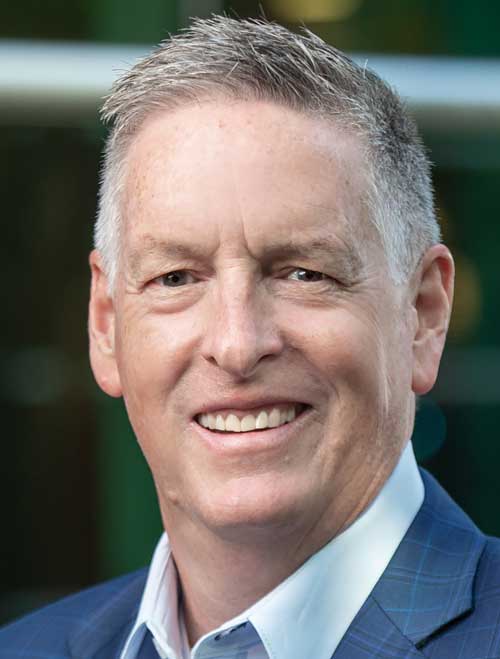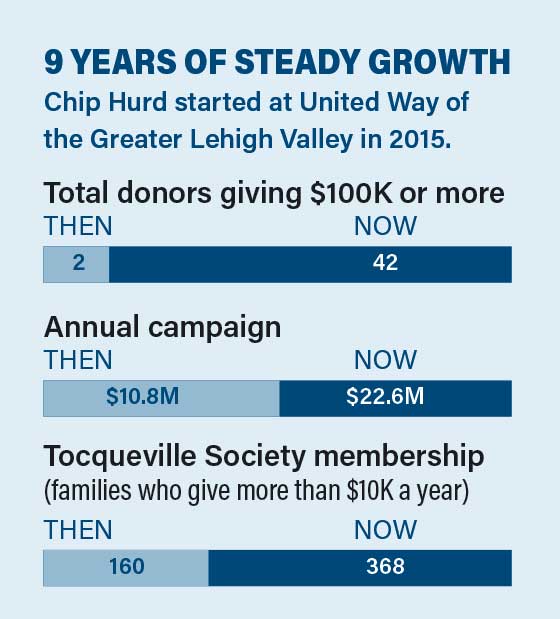
When you live in the same community for 50 years, relationships go deep. For Chip, who was born and raised and raised his kids in the Lehigh Valley, Pennsylvania, many United Way donors are not just professional acquaintances, but personal friends.

GIVING Magazine
For those who drive change — not watch it. Join the top 1%.
This article was originally published in Giving Tomorrow magazine.
The gym erupted. Angry shouts and “boos” from one half of the arena drowned out the cheers from the other half. Paul ‘Chip’ Hurd ignored them all.
He stood firm-footed in front of the scorer’s table and held up two hands to display the jersey number of the player who committed the foul.
After years of refereeing high school and college basketball, Chip was used to the heckling. After all, he says, “I could make the easiest call and half the people would still disagree with me. Half would say you’re right; half will say you’re an idiot.”
As a teenager, Chip wanted to be a referee in the NBA. But one too many knee surgeries took that option off the table, so he settled for refereeing high school and college games. The NBA’s loss turned out to be a win for the Lehigh Valley community where Chip is Chief Philanthropy Officer at United Way of the Greater Lehigh Valley.

Left photo: The United Way’s Day of Caring unites over 1,000 volunteers to do service projects at 50 nonprofit organizations in the Greater Lehigh Valley. Pictured left to right: Laura McHugh, United Way’s VP of Marketing and Communications; Tony and Adrienne DaRe, 2023 Campaign Co-Chairs; Chip Hurd. Right photo: As much as Chip loves his work, his family has always been most important. Pictured left to right: Chip, Abby, Susan, and Matt Hurd.

Besides the rejection training he got on the basketball court, Chip learned something important about hearing ‘no’ at his first fundraising job at Muhlenberg College. The president at the time was a man named Arthur Taylor who remained a friend and mentor to Chip until his passing in 2015.
“He taught me not to take ‘no’ as ‘never,’” says Chip. “When you ask for a large sum and you get a ‘no,’ it might just be that the timing is wrong or the project is not right.”
At the same time, Chip’s boss, Tilghman Moyer, taught him to beware of an immediate ‘yes.’ Chip recalls a woman in her 80s who was a donor to the college and had become a friend to his family. She would occasionally swing by Chip’s house on a Sunday afternoon to take his kids out for ice cream. So, after her husband passed away and the college had a plan to ask her for a $1 million gift for a research lab in her late husband’s name, Chip and Tilghman were the natural ones to make the ask.
She leaned over the table, grabbed Chip’s arm and said, “I’d love to do that.”
Back at the office, they delivered the good news to the president.
“She said yes immediately?” asked Arthur.
“Yes!” said Chip, with a smile.
“You didn’t ask for enough.”
At Arthur’s request, Chip and Tilghman requested another meeting with the woman and this time asked her to name the whole building with a gift of $3 million. Again, she grabbed his arm and said she would love to do that.
“Now 20 years later I’m kicking myself and wondering if $3 million was enough,” Chip laughs.

When you live in the same community for 50 years, relationships go deep. To Chip, who was born and raised and raised his kids in the Lehigh Valley, many United Way donors are not just professional acquaintances, but personal friends.
“I love that so many of my donors are friends,” says Chip. “We text each other: Meet me tomorrow for breakfast?”
These kinds of relationships, combined with a lifetime spent in the community where he serves, combined with Chip’s easy, friendly way of asking for support seem to be a winning recipe for fundraising success. From 2010-2023 the United Way of the Greater Lehigh Valley experienced an increase in their annual campaign every year.
“There are more than a thousand United Ways in the country, and as far as I know we’re the only one that’s up 13 years in a row,” says Chip.
He says this without a trace of boasting and is quick to give credit to his colleagues and his community. “We have an awesome team. Cumulatively, our executive team has had 100+ years of United Way experience,” he says. “And we have a resilient, caring community. Our volunteers, our corporate partners, our community philanthropists … when times were at their toughest, those who could stepped up and did more. This is the best job I’ve ever had!”
Chip’s United Way has twice been recognized by United Way Worldwide as a Center of Excellence, where other United Ways send staff to the Lehigh Valley to learn best practices and how they have created a formula for success. Some of their secret sauce can’t be easily transferred—a staff with longevity and deep roots in the community, for example. But one thing Chip can and does recommend to other charitable organizations: Learn to collect data and use it well.
Chip is surprised how many other United Ways don’t utilize the demographic data they have available at their fingertips. “When I first started in fundraising in 1995, we didn’t have data readily available like we do today. Now in seconds you can find out someone’s annual household income, what their house is worth, how much they donate to charity, etc. Of course, you don’t go into the first meeting and blast the donor with all this information you’ve dug up on them. But you do use it. David Lewis, our president, and I just geek out over data. We are so data-driven, numbers oriented— because data and numbers don’t lie! It actually helps drive and frame our annual fundraising plan.”
Chip is proud of the fact that his United Way’s investment portfolio “shows where every penny raised goes into community. You can add up everything, and it will total exactly what we raised.” Transparency builds trust. And without trust, you don’t have much.
Chip feels certain that “donors give us more money because we have great results and great impact.” He says, “They’d still support us if we didn’t have the data because I believe I have built strong relationships over the years. But they give more because we get great results, and we can show it.”
Clockwise from left: Chip and Kristen Quirk, a member of the United Way’s Tocqueville Society, attend a community leadership event; Chip chats with Tocqueville Society member Laurie Hackett at a community leadership event; a younger Chip gets ready for a baseball game with his brother Tim and father Paul in front of his Lehigh Valley childhood home, circa 1976; Chip and his family hang out at a Baltimore Ravens pregame party.